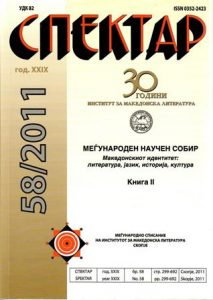ИНТЕРКУЛТУРНА КОМУНИКАЦИЈА: ПРЕВОДОТ КАКО СРЕДБА НА НАЦИОНАЛНИТЕ ИДЕНТИТЕТИ
COMMUNICATION ACROSS CULTURES: TRANSLATION AS AN ENCOUNTER OF DIFFERENT IDENTITIES
Author(s): Alicja PstygaSubject(s): Translation Studies, Identity of Collectives
Published by: Институт за македонска литература
Keywords: national identity; translation; cultural and language barriers; multiculturalism; intercultural competence
Summary/Abstract: The interest in the national identity of Slavic people is related to the processes of social, political and ideological changes as well as to European integration and globalization. The question of the national identity of Slavic people concerns similarities and differences between them, influenced by the specific perception and categorization of reality. After the period of forced transnational integration and constructed linguistic and cultural national communities, the Slavic linguistic views of the world are diversified. Both for Macedonian and Polish people, language is one of the exponents of national identity. Macedonian literary texts translated into Polish enable readers to encounter different cultural phenomena, reflected in artistic visions and symbols. Their perception is quite difficult as it requires profound knowledge and intercultural competence. As examples, we will consider Polish translations of two important contemporary Macedonian novels, Vremeto na kozite (Polish title: Czasy kóz [The times of goats]) by Luan Starova and Razgovor so Spinoza: roman-pajažina by Goce Smilevski (Polish title: Rozmowa ze Spinozą: Powieść pajęczyna [A conversation with Spinoza: A Spider Web Novel]).
Journal: Спектар
- Issue Year: 2011
- Issue No: 58
- Page Range: 614-621
- Page Count: 8
- Language: Macedonian

